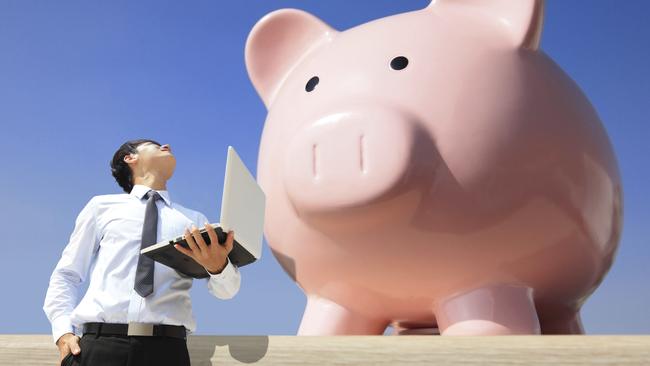Ten budget measures every investor should get to know for the year ahead
There is good news for pensioners and low income families, and self-funded retirees finally get something with an extension of the freeze on deeming rates.

There is good news for pensioners and low income families, and self-funded retirees finally get something with an extension of the freeze on deeming rates.
The tax cuts are ready to roll
The budget measure that will affect most people are the tax cuts due to start on July 1, which will allow most Australians to bring in a higher take-home salary.
The lowest rate where no tax is paid will be up to $18,200 a year.
The starter band for tax will then be $18,201 to $45,000, where the rate will be 16 per cent (down from 19 per cent).
After that the 32.5 per cent rate will be cut to 30 per cent for $45,000 to $135,000.
Then the 37 per cent rate will kick in at $135,000 (previously $120,000) and the 45 per cent rate now cuts in at $190,000, up from $180,000.
* The new tax bands put more of your pay packet in your pocket.
A cash splash into housing
In the budget papers, one of the biggest payment areas will be social housing. Separately, there was some news on commonwealth rent assistance and in relation the build-to-rent sector.
The commonwealth rent assistance package will be lifted again, this time by 10 per cent at a cost of around $1.9bn over five years.

Meanwhile, the much-vaunted but still nascent build-to-rent sector has been given more scope for development with the government allowing foreign investors to buy BTR, along with the existing ability to build new projects providing the property stays as BTR.
The key measure in the package is around $10bn to go into social housing which is to be matched by the states.
With rental vacancy rates currently near one per cent in the major cities and rent increases running at double digits last year, the supply of new accommodation should in theory open up the supply of the wider housing sector, putting downward pressure on rental hikes in the year ahead.
* The cash splash for low-income housing should help to ease rental pressures across the board.

Deeming rate freeze extended
For the last two years the government’s deeming rate has been unchanged with the top rate of deeming held at 2.25 per cent – under the terms of the budget the rate is to remain unchanged for a further 12 months.
The deeming rate is the government’s assumed return on a retiree’s investments – it determines how much can be accessed by a retiree or whether they can get a pension in the first place.
With the RBA cash rate at 4.35 per cent, it was assumed the deeming rate would rise. Almost half a million pensioners and part-pensioners will be greatly relieved the government has not moved the rate as it means there will be no reduction in pension income to this group.
* Half a million pensioners can relax, the deeming rate is staying unchanged.
New super caps
Despite all the talk about inflation in the budget papers the adjustments for inflation (so-called inflation indexing) across the super system is a random patchwork badly in need of a clean-up and this budget did not attempt any reforms here.

So there is no inflation indexing intended for the new super tax which will be 15 per cent and will cut in at $3m. Similarly there is no indexing of the high income super tax – which is called Division 293.
The key inflation adjustments starting on July 1 will be the amount you can put into super each year. The pre-tax cap will move from $27,500 now to $30,000 on July 1. The post-tax cap will move from $110,000 now to $120,000.
* You will be able to put $2500 more into super on a pre-tax basis from July 1
‘SGC creep’
You will have heard of bracket creep in personal taxes where an unchanged tax band captures more people every year as their wages rise.
Something similar is quietly happening in super as the annual Superannuation Guarantee Charge creeps ever higher. Right now 11 per cent of your salary must go into super each year. From July 1 that lifts to 11.5 per cent, and from July 1 2025 it goes to 12 per cent.
The escalation of the charge means that your take-home pay effectively reduces (though this will be offset by the personal tax cuts coming in on July 1).
But the most important item for investors to keep in mind is that if you go to make a voluntary contribution to super to maximise your super tax concessions, then you must subtract the amount taken out on a compulsory basis by the SGC.
* The looming uptick in compulsory super contributions needs to be carefully monitored.
Good times for lithium and nickel miners
It’s not every day the federal government gets in behind the mining industry and actively offers a sub sector better terms. But this is exactly what is happening with a scheme for critical mineral tax incentives aimed at “future facing” resources.

The tax scheme (separate to a range of other supports) puts $7bn into this area over 11 years.
The money will flow into key future facing commodities such as nickel and lithium. Among the listed companies that are in a very good position to benefit from this move are BHP, Wesfarmers, Pilbara Minerals, MinRes and Liontown Resources.
* A free kick for listed lithium and nickel miners.
The Medicare levy exemption just got bigger
This is a simple measure which is also related to inflation. Here’s how they put in the budget papers: “The Government has increased the Medicare levy low-income thresholds for singles, families, and seniors and pensioners from 1 July 2023 to provide cost-of-living relief. The increase to the thresholds ensures that low income individuals continue to be exempt from paying the Medicare levy or pay a reduced levy rate.”
The increase to the thresholds accounts for recent annual CPI outcomes and is estimated to decrease receipts by $640m over the four years to 2026–27.
The threshold for singles has been increased from $24,276 to $26,000. The family threshold has been increased from $40,939 to $43,846.
* As we know the adjustments for inflation across the budget are random, in this case at least those on lower income got an uplift.

Super in parental leave – finally
The campaign for getting super paid on parental leave has been around for so long you might be forgiven for thinking it was done and dusted years ago – but it only gets confirmed this year with the budget outlining the deal for parents which will cost more than $1.1bn over four years and commence on July 1 2025.
By July 1 2025 the Superannuation Guarantee Charge – the compulsory amount which must be put into super from annual salary – will be 12 per cent, it is currently 11 per cent moving up to 11.5 per cent on July 1.
The deal will offer government-funded parental leave with the SGC paid for up to 26 weeks.
* Higher wages and an ever-rising SGC charge mean the super on parental leave scheme is going to be more expensive
Energy bill rebate and PBS freeze
The Albanese government has concentrated heavily on accommodation and energy bills in the budget. Among the many initiatives in the energy sector, especially in green energy, there is a monster $3.5bn energy relief program which will ensure that every household in Australia regardless of income level will be made aware of the government’s efforts to offer universal relief on energy prices.
In a similar vein the government has adopted an everybody-in approach to the Pharmaceutical Benefits Scheme, where all pensioners and seniors card holders will enjoy another 12-month freeze on prices for items under the scheme.
* Everyone gets an energy bill rebate, every pensioner gets another year of unchanged PBS prices.
Ramping up the ATO
Every year in every budget the Australian Taxation Office gets more money – and the promise is that for every extra dollar the tax office gets it will bring in even more revenue for Canberra. This year sees the ATO get an extra $187m for yet another ‘tax crackdown’. And will it pay off? Along with related measures granting power and resources to the tax office the government expects to increase receipts by $302m in savings over the forward estimates period.
* The ATO remains the gift that keeps on giving for the government.








To join the conversation, please log in. Don't have an account? Register
Join the conversation, you are commenting as Logout